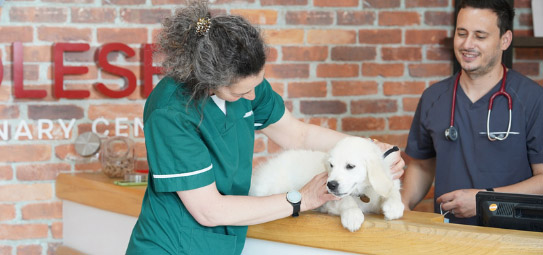
Look After Your Pet’s Skin this Winter with Tips from Vet Darren Partridge
December 12, 2024
Winter in Surrey can be hard on your pet’s skin, which is why keeping them comfortable during the cold months is essential. In this article, our Vet Darren Partridge is sharing some tips to help your pet, and their skin, stay happy and healthy.
Be sure to book an appointment today to talk to our team about your pet’s winter skin care needs.
Darren’s winter pet skin care tips
First, Darren is sharing the common signs that may indicate your pet’s skin is irritated during winter:
- Dry, flaky skin
- Redness or inflammation
- Excessive scratching or licking
- Brittle or dull coat
- Scabs or sores
- Odour
Get in touch if you have noticed any of the above signs. Below, is Darren’s advice on how you can protect your pet’s skin from the effects of winter.
1. Hydration
Heating your home during winter can cause low humidity i.e. the air becomes too dry. Using a humidifier may help to combat problems caused by this and maintain healthy skin. Dry air can also lead to dehydration, which often results in dry, flaky skin. It’s improtant to keep your pet’s water bowl filled with fresh water at all times. Even small furries, like rabbits and guinea pigs, need to stay hydrated.
If you’re unsure whether your pet is drinking enough, don’t hesitate to ask our team at Molesey Vets for advice.
2. Fewer baths
Frequent baths can strip your pet’s skin of essential oils so read our Darren’s advice below:
- For dogs, limit baths to every few weeks and use a gentle, moisturising shampoo to avoid drying out their skin.
- It’s rare for cats to be ok with bathing, but if yours enjoys an occasional soak in the tub, be sure to use pet shampoo formulated for cats.
- Rabbits and guinea pigs typically groom themselves, so they usually don’t need baths – just regular brushing to keep them comfortable. However, if your small pet is arthritic or unwell and struggles to groom their rear end (making them a target for flystrike), it’s wise to keep them clean with a damp cloth or a ‘butt bath’ – ask our vet nurses in East Molesey about how to do this safely.
- Be sure to dry your pet well after a bath to prevent them from getting cold.
3. Paw protection
Salt and ice on the ground in Surrey can be harsh on your dog’s paws. After walks, make sure to wipe down their paws to remove any residue. It’s wise to check and wipe your cat’s paws too when they return home from wandering the winter streets.
4. Clean and dry bedding
Ensure your pet’s bedding is dry and clean to prevent skin irritation, especially for guinea pigs and rabbits who will need soiled materials removing regularly.
5. Regular grooming
Grooming your pet regularly will help to keep your pet’s coat healthy during winter. Brushing your dog’s or cat’s fur helps distribute natural oils and prevents matting. For small furries, regular grooming also removes debris and prevents long-haired fur from getting too tangled. If you’d like any advice on how to groom your pet, our veterinary nurses in East Molesey would be happy to give you a demonstration.
6. Healthy diet
A diet rich in omega-3 fatty acids is great for maintaining healthy skin and a shiny coat. Darren recommends asking our veterinary nurses at Molesey Vets about the best food options to keep your pet’s skin hydrated and healthy throughout the winter months. A nutrition consultation could be just what your pet needs to stay in top shape – contact us to book this now.
Book an appointment today
If you’ve noticed that your pet’s skin needs extra care, don’t wait! Book an appointment with our expert team at Molesey Vets for tailored advice and support. Whether it’s a health check-up, a grooming demonstration, or a nutrition consultation, we’re here to help.
Contact us to book an appointment now



